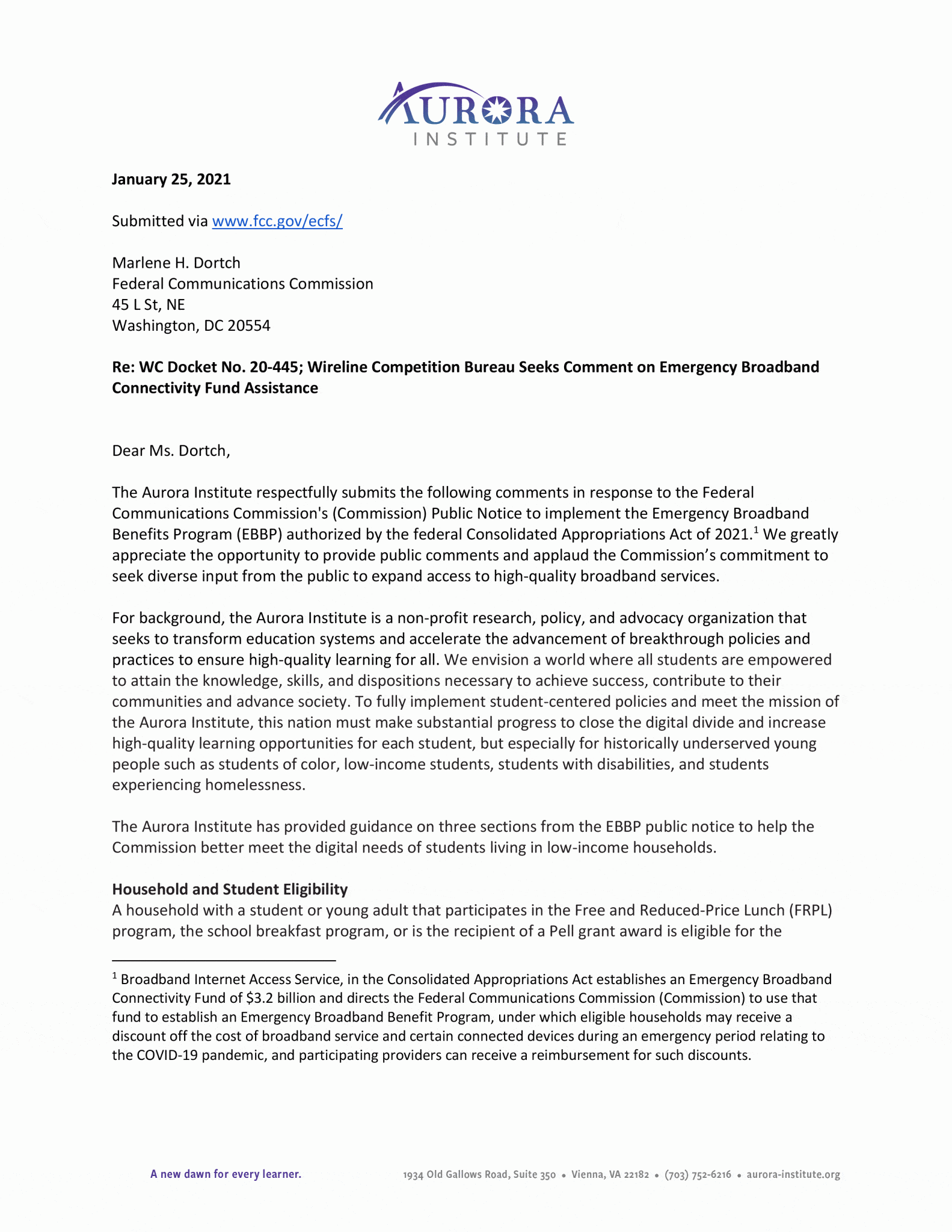Public Comments Submitted on the Emergency Broadband Benefit Program
Education Domain Blog
The Aurora Institute submitted a formal public comment letter to the Federal Communications Commission’s Public Notice regarding the implementation of the Emergency Broadband Benefit Program (EBBP). The FCC requested input on how best to structure and administer the new $3.2 billion program to support internet access by and the supply of connected devices to households living on low incomes.

The Aurora Institute Center for Policy provided guidance on three sections from the EBBP public notice—household eligibility, software and broadband requirements, and marketing and stakeholder engagement. It is our hope that all qualifying households receive the EBBP financial discounts, and all eligible providers support households with the appropriate level of broadband capabilities so that low-income students can fully participate in remote learning. Moreover, it’s critical that all community and local stakeholders are sufficiently and efficiently informed of the availability of these benefits.
On household eligibility, Aurora recommends that:
- All households with a student who attends a school with a poverty rate higher than 50 percent or who uses Community Eligibility should be eligible for the EBBP; and
- The Commission determine the overall cost to provide free broadband coverage to all homes with a student eligible for free or reduced-price lunch and ask Congress to fund this emergency program at the level necessary to connect all students living in low-income households to expand the availability of high-quality remote learning.
On minimum software and broadband requirements, Aurora recommends that:
- All funded devices should support video conferencing and school district-selected digital learning software;
- All eligible internet service providers (ISPs) should be required to offer enough broadband support so multiple household members can stream classes at the same time; and
- All eligible ISPs should be required to offer a minimum of 5 Mbps upload and download speed for participating households.
On marketing and stakeholder engagement, Aurora recommends that internet service providers:
- Partner with civil rights and faith-based organizations, as well as community centers to market the benefits of the EBBP;
- Require participating providers to publicize EBBP benefits through flyers, electronic notices, social media, at schools, and in bill statements; and
- Advertise these services widely and aggressively through the mail for families with no phones, at school pick-up sites, and through phone calls and emails; the program should ensure marketing materials are translated and accessible for non-English speakers and people with disabilities.
The Emergency Broadband Benefit Program
The Consolidated Appropriations Act of 2021 establishes an Emergency Broadband Connectivity Fund of $3.2 billion. The fund provides a broadband subsidy program for qualified low-income households during the COVID-19 pandemic, the Emergency Broadband Benefit Program. Under this legislation, eligible households may receive a discount on the cost of broadband service and certain connected devices, and participating providers can receive reimbursement for such discounts.
The program asks providers to provide eligible households a $50 monthly discount off the standard rate for an internet service offering and associated equipment and up to $75 for eligible households on tribal lands. The legislation defines an eligible household as being eligible for free or reduced lunch, has received a Federal Pell Grant in the current award year, is eligible for the Lifeline program, has experienced a substantial loss of income since February 29, 2020, or meets the eligibility requirements of the providers existing low-income or COVID-19 program. The EBBP is slated to begin on the date of enactment of this round of federal stimulus legislation and end 60 days after the COVID-19 national emergency declaration expires.
Learn More:
- Aurora Institute – Federal Policy Priorities to Accelerate Education Innovation
- Aurora Institute – Future Focused State Policy Actions to Transform K-12 Education
- Aurora Institute – Education Policy Issues for the COVID-19 Era: Policy Actions and Responses to Leverage the Moment for Future Readiness
- Aurora Institute – Build Robust Technology Infrastructure and Improve Broadband to Expand Educational Opportunity
- Aurora Institute – New Stimulus Bill Puts K-12 Education on the Road to Recovery
- Alliance for Excellent Education – Students of Color Caught in the Homework Gap
- Pew Research Center – Nearly one-in-five teens can’t always finish their homework because of the digital divide